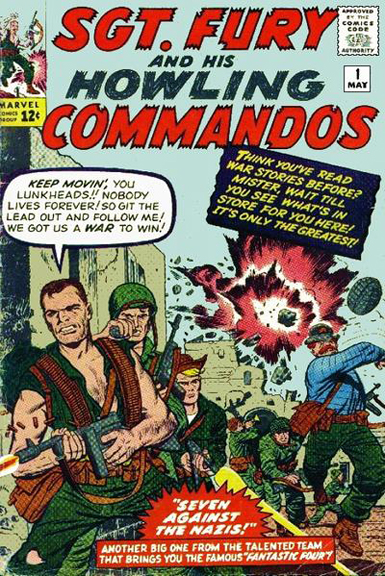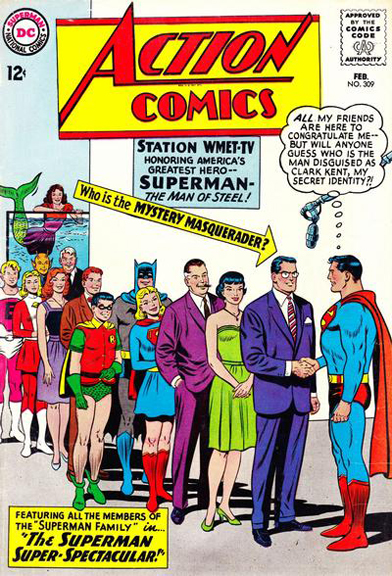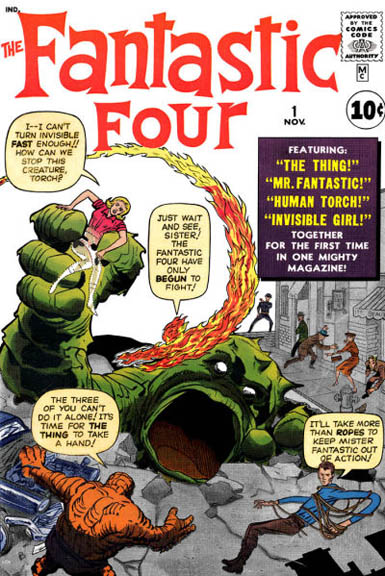Advance Review: TwoMorrows’ American Comic Book Chronicles: The 1960s (1960-1964)
by KC Carlson
You may think you know the history of comic books in America, but I can pretty much guarantee that you don’t know it all. Why can I say that? I’ve just read an advance copy of The American Comic Book Chronicles: The 1960s (1960-1964), a 224-page hardcover history of that decade published by TwoMorrows, and I was amazed to learn fantastic new information — or at the very least, the clarification of previous history that was murky at best. I know a lotta stuff, so if I found things I didn’t know before, I bet you will, too.
The book was painstakingly researched and written by John Wells, who for several decades has been accumulating data on virtually everything about comic books and strips. He’s been sharing said research with various comics professionals, behind-the-scenes, before now going public with what he knows. So I’m warning you, the dam is about to burst, and you better have the flood insurance that this book provides! Each of the five lengthy chapters covers easily over a hundred different titles, characters, and creators. Learn oddball trivia about all your favorite characters — as well as hundreds that you’ve probably never heard of! (Mark Waid excepted.)
It’s not just about Atlas/Marvel and DC. This volume also covers the great and underrated comics from Dell/Gold Key, Charlton, Archie, Harvey, ACG, Warren, and maybe even a few that you’ve never heard of.
TIME MARCHES ON!
Each chapter features a timeline, with not just major comic book events, but also their context, with news of the world and major pop culture highlights. For instance, did you know that Marvel’s Sgt. Fury and His Howling Commandos #1 was published about the same time as Betty Friedan’s The Feminine Mystique, in February 1963? (Both should be on every good fanboy’s bookshelf.) Also, both Amazing Spider-Man #1 and She’s Josie #1 (later Josie and the Pussycats) first went on sale in December 1962. Coincidence? I think not… One more: On March 26, 1964, Julius Schwartz, Carmine Infantino, and John Broome revamped Batman and began the process by which DC Comics took creative control of the character from Bob Kane. The very next day, in Alaska, there was a 9.2 magnitude earthquake — the largest in North America and second largest on Earth. Where was Bob Kane on March 27, 1964?
The meat and potatoes of the book are the detailed chapters that make up each individual year. Wells masterfully winds the entire year’s comic history from event to event, publisher by publisher. For example, Wells picks Sergio Aragonés’ first sale to MAD to open 1963, followed by painter Roy Lichtenstein making an impact on not only the art world but on other artist’s wallets. That period closes with a poignant and fascinating look at how the tragedy of JFK’s assassination affected the comic book industry, as well as the secret history behind an ill-timed JFK appearance in Action Comics.
RECLAIMING AND RECLARIFYING
What fascinates me most about The American Comic Book Chronicles: The 1960s (1960-1964) is the enjoyable tone. Wells really piles on the history, but at no point do you ever feel like you are reading a dry history book. This version is filled with new nuances on old stories. Case in point: pretty much everybody has read at least one account about how the creation of the Fantastic Four sprung from either a golf game between Marvel (Atlas, actually) and DC executives or from Stan Lee’s desire to write something different than the endless monster and western stories he’d been churning out for years. Well, John Wells has probably read all of those accounts, and he has distilled possibly the definitive version — not forgetting to include Jack Kirby in the equation. It’s also quite fun to see Kirby pop up all over the place — not just doing Marvel’s monster books — in the early 1960s. And Wells has also possibly resolved some old mysteries (such as the coincidences between the timing and similarities of Marvel’s X-Men and DC’s Doom Patrol’s villainous Brotherhoods of Evil).
Another important factor is Wells’ uncanny ability to present all this fantastically conceived history at a human level, concentrating on the creators whose imaginations were allowed to run wild. Wells excels in telling us the tales of both superstars (Lee and Kirby) and the often unsung (Ramona Fradon, Bob Bolling, Russ Manning).
My favorite parts of this book involved learning details of things I knew a little bit about (like the split between powerhouse licensed publishers Dell and Gold Key), coming away with better comprehension of what exactly happened there, told in an easy-to-understand way.
Yes, there’s a lot about Superman and Spider-Man and Batman and the Avengers and the Justice League. There’s also a lot about Space Family Robinson, and Metamorpho, and Herbie, and Ant-Man, and Josie, and Uncle Creepy, and Sad Sack, and most every other character that was important to someone at some point. That’s the real reason why this book is so important — because everything in it is going to be important to somebody today, tomorrow, and at some time in some wacky impossible future. Now that’s some history book!
The American Comic Book Chronicles: The 1960s (1960-1964) is the first in a multi-volume series. The plan is to ultimately cover comic book history from the 1940s up until today. In 2013, look for 1965-1969, also by John Wells, as well as volumes on the 1970s and 1980s.
KC CARLSON: Writing this in Virginia. Seeing it in “print” in Wisconsin. It’s magic, I tell’s ya!
Purchase
American Comic Book Chronicles: The 1960s (1960-1964)
Classic comic covers from the Grand Comics Database.






USER COMMENTS
We'd love to hear from you, feel free to add to the discussion!